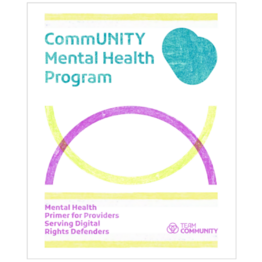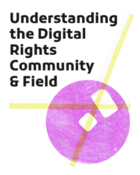Toolkit for Psychosocial Providers Serving Digital Rights Defenders: Difference between revisions
No edit summary |
|||
| (5 intermediate revisions by the same user not shown) | |||
| Line 1: | Line 1: | ||
[[File:Mental+Health+Primer.png|right|frameless|262x262px||alt=Mental Health Primer's cover |link=https://static1.squarespace.com/static/5f5274d8c4e54f6ba3b7f7d4/t/647613444496ff7451669238/1685460267660/Mental_Health_Primer.pdf]] | [[File:Mental+Health+Primer.png|right|frameless|262x262px||alt=Mental Health Primer's cover |link=https://static1.squarespace.com/static/5f5274d8c4e54f6ba3b7f7d4/t/647613444496ff7451669238/1685460267660/Mental_Health_Primer.pdf]] | ||
'''''Mental Health Primer for Providers Serving Digital Rights Defenders''''' is the first educational toolkit designed for psychosocial providers and | '''''Mental Health Primer for Providers Serving Digital Rights Defenders''''' is the first educational toolkit designed for psychosocial providers and mental health professionals serving, or wanting to serve, digital rights defenders (DRDs)''.'' | ||
DRDs are individuals from diverse regions and disciplines working on issues related to digital rights, privacy, Internet freedom, and freedom of expression. | |||
This toolkit gives insights that can help reduce the barriers and gaps DRDs experience when seeking psychosocial support and services, and help mental health providers improve the care they offer. | |||
{| class="wikitable" style="margin-right: auto; margin-left: 0px; width: Auto; background-color:#FDD34D;" | {| class="wikitable" style="margin-right: auto; margin-left: 0px; width: Auto; background-color:#FDD34D;" | ||
| Line 8: | Line 12: | ||
== How to use this Toolkit?== | == How to use this Toolkit?== | ||
This toolkit is primarily designed for mental health professionals working with DRDs, to ultimately help them provide better support and services for their clients. However, we also suggest that digital rights defenders share this toolkit with mental health professionals they are currently working with, as it will help improve the overall care they receive | [[File:Understanding the digital rights community and field, Mental toolkit design.png|175x175px|link=https://static1.squarespace.com/static/5f5274d8c4e54f6ba3b7f7d4/t/647613444496ff7451669238/1685460267660/Mental_Health_Primer.pdf|left]] | ||
This toolkit is primarily designed for mental health professionals working with DRDs, to ultimately help them provide better support and services for their clients. | |||
However, we also suggest that digital rights defenders share this toolkit with mental health professionals they are currently working with, as it will help improve the overall care they receive. | |||
In addition, DRD organizations looking to hire mental health professionals could use this primer to gain a better understanding of the type of profiles to look for in their search. | |||
==What is inside the Toolkit?== | ==What is inside the Toolkit?== | ||
*Historical view of the psychosocial services in the digital rights field. | *Historical view of the psychosocial services in the digital rights field. | ||
*Experience and values of digital rights defenders (DRDs). | *Experience and values of digital rights defenders (DRDs). | ||
| Line 17: | Line 24: | ||
*Causes related to the abandonment of avoidance of care. | *Causes related to the abandonment of avoidance of care. | ||
''We want to thank the various DRDs who have been asking for the creation of this primer for years. For their privacy, we will refrain individuals by name, but we are super grateful for their commitment to advocate for their fellow DRDs.'' | ''<big>We want to thank the various DRDs who have been asking for the creation of this primer for years. For their privacy, we will refrain individuals by name, but we are super grateful for their commitment to advocate for their fellow DRDs.</big>'' | ||
Latest revision as of 22:17, 26 March 2024

Mental Health Primer for Providers Serving Digital Rights Defenders is the first educational toolkit designed for psychosocial providers and mental health professionals serving, or wanting to serve, digital rights defenders (DRDs).
DRDs are individuals from diverse regions and disciplines working on issues related to digital rights, privacy, Internet freedom, and freedom of expression.
This toolkit gives insights that can help reduce the barriers and gaps DRDs experience when seeking psychosocial support and services, and help mental health providers improve the care they offer.
| VIEW THE TOOLKIT'S PDF HERE |
How to use this Toolkit?

This toolkit is primarily designed for mental health professionals working with DRDs, to ultimately help them provide better support and services for their clients.
However, we also suggest that digital rights defenders share this toolkit with mental health professionals they are currently working with, as it will help improve the overall care they receive.
In addition, DRD organizations looking to hire mental health professionals could use this primer to gain a better understanding of the type of profiles to look for in their search.
What is inside the Toolkit?
- Historical view of the psychosocial services in the digital rights field.
- Experience and values of digital rights defenders (DRDs).
- Trends related to the psychological health of DRDs, and protective factors.
- Causes related to the abandonment of avoidance of care.
We want to thank the various DRDs who have been asking for the creation of this primer for years. For their privacy, we will refrain individuals by name, but we are super grateful for their commitment to advocate for their fellow DRDs.